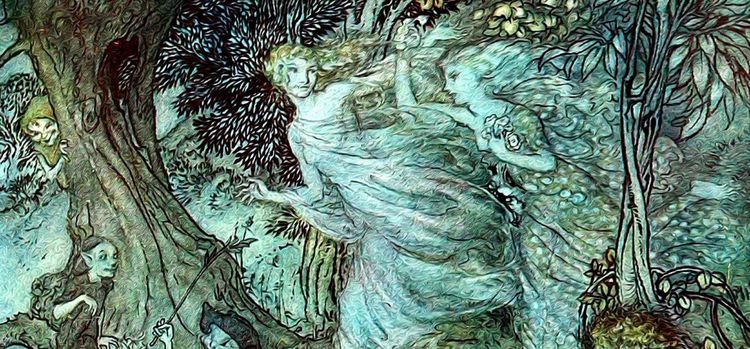Music, dissociation, and alienation

Dissociation is a strange and slippery state, and it can be a challenge to represent. Many films, TV shows, and plays use music to indicate dissociative experiences; what makes them such a good fit?
Content note: As well as discussing dissociation and derealisation, this post contains references to suicide and also to historical Nazism and antisemitic violence.
What dissociation is, and when and why it happens
Broadly put, dissociation is a feeling of being detached from reality; our surroundings or our self.
On one level, dissociation is a very common, everyday experience; it can happen when you are daydreaming, or meditating, or when you are immersed in a film or a video game, or when you drift away into your thoughts for a moment and miss your stop on the train. This is sometimes called "normative" dissociation.
But for some people dissociation can be a very disturbing experience. It may mean feeling disconnected from your body, as if you are watching from the outside. Sometimes it can feel as if the world itself is unreal. Some people find they have missing time and memory gaps.
Dissociation can be a way to cope with very stressful or traumatic experiences, and may persist as a habitual coping mechanism long after the traumatic events are over or a bad situation has passed.
In the past I have had my own experiences of dissociation, ranging from peculiar and disturbing feelings of unreality, to a kind of 'maladaptive daydreaming', which I've touched on in another post.
In my view, like most psychological and emotional phenomena, dissociation isn't necessarily or always a bad thing, and it's not helpful to label it only as a 'symptom' of a condition or disorder.
However, I found that my tendency to dissociate heavily was preventing me from experiencing my own feelings and forging connections with the people and the world around me. At first I had to fight to stay 'present', using various grounding techniques, but over time it got easier and easier.
Music and dissociation
For me it was always stories and not songs; like a TV set in my head, not a radio. However, there seems to be some kind of relationship between music and dissociation. I can't be the only one who sometimes goes striding through the supermarket or gazes wistfully out of a train window with my own personal soundtrack running in the background.
One 2011 study found some of their (very small, very undiverse) sample reported dissociative qualities when they listened to music. Some sought out a dissociative state, and for others it occurred spontaneously, and the group recorded several different effects:
Escape from the self: Listeners sought out music as a defensive technique to escape current anxieties and concerns or to drown out unwanted thoughts.
Change in sensory awareness: Listeners experienced multi-sensory engagement and sense of “derealization.” Some found that their senses were sharpened with hyper-awareness; others felt that their experience were muted, as if things were happening in slow motion or under water.
Some listeners found that the changes in their awareness occurred together with imaginative involvement. Their own memories, associations and fantasies affected how they experienced the music and their surroundings.
Finally, some listeners reported a spontaneous vacancy or absence. Their sense of self and of their surroundings spontaneously receded from awareness.
The study put forward some ideas about why music seems to facilitate normative dissociation:
- Like many art forms, music doesn't have a fixed meaning, so its meaning can be personalised.
- Recorded music is portable and repeatable, through recordings and mobile technology. (I'd suggest specifically that through the use of headphones it is both portable and private, it can be an intimate experience and act almost like a kind of protective bubble of sound.)
- Music offers different “distractors”: which could be the sounds, the words, or the associations prompted by a song.
One aspect that I feel is missing from the list of suggestions above is the relationship between music and narrative. After 120+ years of film scores and soundtracks (whether recorded on the film or played as live accompaniment!), plus centuries before that of narrative musical forms such as opera, ballads, folk songs, I think that story and sound are deeply entwined for most people. It's this aspect of music which I feel often prompts the "imaginative involvement" reported by the sample group.
Musical interludes
Thinking about this subject I became interested in how often I'd seen dissociation represented through music in films and television, from Daisy's job interview in Spaced, where the interviewer's questions are gradually drowned out by the Magic Roundabout theme tune, to Harley Quinn's hallucinatory tribute to Marilyn Monroe in Cathy Yan's Birds of Prey.
In exploring this device a bit further I'm going to look at two works in more detail: the 1980s stage play Good by C.P. Taylor and the 2010s TV series Crazy Ex-Girlfriend by Rachel Bloom. (Spoiler warning for both, I'm afraid!)
Wildly different in style, tone, and theme, one thing which they share and which interested me about both is that they use music to show their respective protagonists dissociatively 'checking out' of emotionally charged situations. Both explore the dire consequences of this social and emotional disconnection for the protagonists and the people around them. In Good, the consequences are no less than catastrophic.

The band was real
Recently I saw a production of Good, starring David Tennant as John Halder, a liberal university professor in pre-war Germany, who - through a process of gradual rationalisation - not only joins the Nazi party, but becomes an SS Officer and participates in atrocities against the Jewish people, abandoning his mentally ill wife, his disabled mother, and his Jewish best friend Maurice to their fates.
I thought it was an excellent production, and so deeply chilling that I've been thinking about it constantly since. One aspect which intrigued me is that throughout the play Halder complains about a "neurosis"; he constantly hears music in his head. The play opens with him musing on it:
The bands came in 1933. So you can’t say they came with the rise of the Nazis, exactly. The Nazis were on the rise long before that. To some extent, it was a device that was with me from childhood. Bringing music into the dramatic moments of my life. But from ’33, they became an addiction. Jazz bands… café bands… tenors… crooners… symphony orchestras… Depending on the particular situation and my mood. A strategy for survival? Turning the reality into fantasy?
He describes some aspects of his experience to Maurice (a psychoanalyst):
I can’t get lost you see? I can’t lose myself in people or situations. Everything’s acted out against this bloody musical background... Could it be some sub-conscious comment on my loose grip of reality? The whole of my life is a performance? Is that too glib, do you think, Maurice?
But Halder tells the audience about his deepest dissociative experience, what I would term derealisation:
Is nothing I touch real?… Is it? My whole life is like that… I do everything, more or less, that everybody else does… But I don’t feel it’s real. Like other people. On the other hand, it could be other people probably feel the same thing…
I saw aspects of my own past experiences in what Halder describes, and that frightened me. I don't think I had made the conscious connection before between derealisation and dehumanisation. But if the world doesn't feel real, if other people don't seem real, then a dangerous space is opened up.
The play shows the many subtle ways that Halder's self-protective numbness and distraction enable him to be manipulated, and insulate him from empathy or remorse. He feels as if he is outside the events which are taking place. For Halder it's not even a question of "us and them", but only of himself, and beyond, a world of dubious reality. He lies to himself, and this makes possible further lies, to everyone he encounters.
Along with the soundtrack of different songs and musical styles, Halder continuously makes Fleabag-style asides to the audience, often comically at odds with the opinions he shares with the other characters. At one point Maurice notices him doing this:
Maurice: Was that you having a visitation from one of your bands just now?
Halder (to the audience): I do that from time to time. I talk to myself in my mind. That’s another addiction.
It's a telling moment, as Halder instinctively deflects the intimacy and vulnerability of being perceived by his friend into further internal commentary. He turns away from Maurice, as he will again and again until Maurice exists only as a memory - or a ghost.
After following Halder's descent, soundtracked by various imaginary songs and orchestras, the play reaches its climax as Halder arrives at a concentration camp to take up a position of advisor. He's accompanied by music, as usual, but is shocked to discover that for once its source is a real band: camp inmates, heads shaved, in ragged striped uniforms, playing to welcome him.
The play ends there, so we never discover whether this is a turning point for Halder, or simply another step along the same vicious road.

A boy band made up of four Joshes
I recognise this is a bit of a tonal curveball, but bear with me... Crazy Ex-Girlfriend by Rachel Bloom was an important show for me because it represented an experience of mental illness in ways I had simply never seen before, with both ferocious honesty and irreverent humour. I understand why so many people bounce off it - sometimes from the title alone - because, well, there's a lot going on. But while it's sometimes a bit patchy, I think it's one of the most original, ambitious, and intelligent TV shows of recent years.
The aspect that's relevant for this post is the show's regular musical numbers, which illustrate episodes from protagonist Rebecca Bunch's increasingly chaotic life. They are incredibly good; funny, clever, catchy parodies from pop culture and musical theatre, from the Spice Girls to Les Miserables. But more than once they cut through to something real.
Here's an early favourite of mine which actually sets out all of the darker themes of the whole show in a way that's seems fairly light and innocuous at the time. (The little girl who appears halfway through is literally Rebecca's inner child.)
Gradually, it becomes clear that these musical interludes are not only storytelling devices but actual dissociative episodes for Rebecca. She is an unreliable narrator, and the musical numbers often offer wish-fulfilment, or at least a romanticized or narrativized version of events.
Over the course of several series the show reveals the harm that this narrativization and detachment from reality does to Rebecca, and to the people around her. Rebecca lies to and neglects her friends, breaks the law (and gets caught), stalks and eventually attacks and then gaslights her love interest Josh. She makes numerous self-destructive choices, including an attempt to take her own life.
After this turning point she begins to confronts the truth of what she has done and works towards getting real help to change. Her dissociative episodes don't stop, but they do start to become more grounded in reality, culminating in "The Darkness", where she sings:
For so many years I've used the darkness to feel / But now there are things in my life that are actually real.
Unlike Halder, Rebecca chooses to try and be present in the world and in her relationships, with all the fear and pain they might entail. In the final episode Rebecca and her best friend Paula have an exchange which is almost identical to the one between Maurice and Halder in Good, where Paula reveals to the audience for the first time that she is aware when Rebecca has 'checked out':
Oh, you're doing that thing that you do. I guess I'll just wait.
For both Maurice and Paula the attention they pay to their friend - and their easy acceptance of their eccentricity - is part of how they show their love. But while Halder flees from the invitation to be truly seen by Maurice, Rebecca takes a risk and shares her inner world with Paula, who visually steps inside Rebecca's daydream.
This is an important step for Rebecca as she struggles to bring her inner and outer realities together, and while she worries that Paula will think she's "crazy", Paula reacts compassionately. Lending her "unfrightened eyes" to her friend's inner experience, Paula helps Rebecca to reframe her dissociative episodes as a sign of her imagination and creativity, an aspect of herself which she has long suppressed but may hold the key to becoming whole and ultimately finding comfort in the reality of her relationships and not a fantasy world.
Yes, I'm going to talk about Brecht
You knew it was coming, and I'm not sorry. In both Good and Crazy Ex-Girlfriend music functions as a Brechtian alienation device, stimulating the audience to question what they are seeing and form judgments about the characters' situations and choices.
(I'd also suggest that both works concern alienation in the Marxist sense too, as both Rebecca Bunch's and John Halder's dissociative tendencies arise or are reinforced by their self-estrangement and social isolation, due in part to stifling norms and narratives around gender, family, and status. But that's another article.)
One of the things that Crazy Ex-Girlfriend does so well is invite you in to Rebecca's fantasy. While you're tapping your toes and blithely watching her carry out comic schemes such as ineptly breaking into someone's apartment, or manipulating the people around her to achieve her own ends, the song and dance number reaches its climax. But when the music ends you find yourself standing in the wreckage of her decisions along with the characters, uncomfortably aware of your complicity.
As the show goes on the audience gets wise, so that when the band strikes up you are forced to ask yourself "Is this really what's going on, or a distortion? What does the narrative suggest should happen now? And what actually needs to happen?" This disorienting uncertainty is deepened by the fact that most of the musical numbers are ironic pastiches, like "Let's Generalize About Men". And they're so damn catchy. Days later you find yourself humming a tune about somebody's mental breakdown.
As if all that wasn't metatextual enough, there's even a song in the show about our collective tendency to apply a narrative filter to our experiences to try and make sense of them! "The End Of The Movie" includes the immortal line "[Life]'s not some carefully crafted story / It's a mess and we're all gonna die."
Whereas the distancing effect in Crazy Ex-Girlfriend creates a sense of challenge and discomfort, in Good it is used to build a mounting sense of horror which reaches an almost unbearable crescendo. The audience are repeatedly forced to confront what they are seeing, and ask themselves "What would I do? What am I doing?"
Though they may be poles apart in tone, message, and literary status, both works play on the dissociative qualities of music to show how tempting it can be to believe in a story than confront painful truth, and how devastating the consequences can be when we turn away from each other and choose a dream over reality.
Dissociation is a common experience for many people in lots of situations. However, if you are experiencing dissociation and feel uncomfortable, Mind has some ideas for grounding activities and other self care which might help. If you find you are regularly dissociating and it is causing problems for you, it may be worth seeking psychological support.





Member discussion